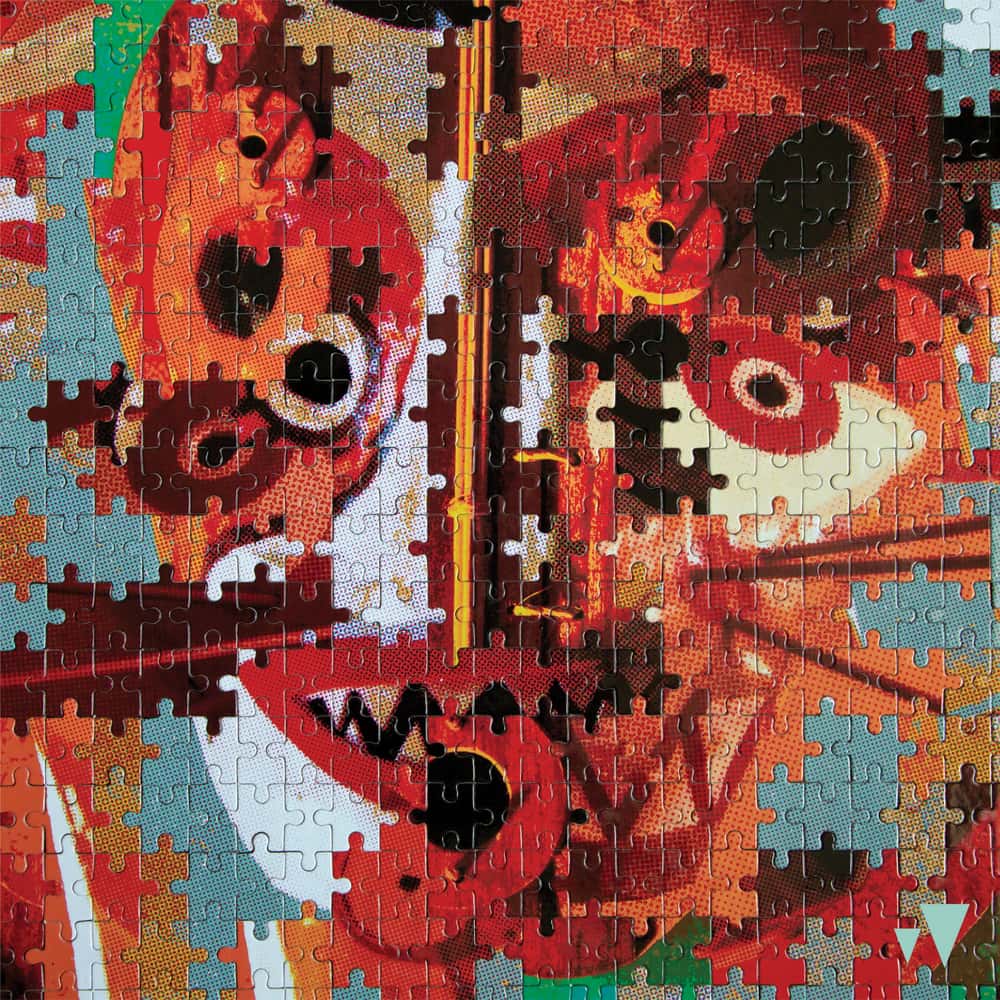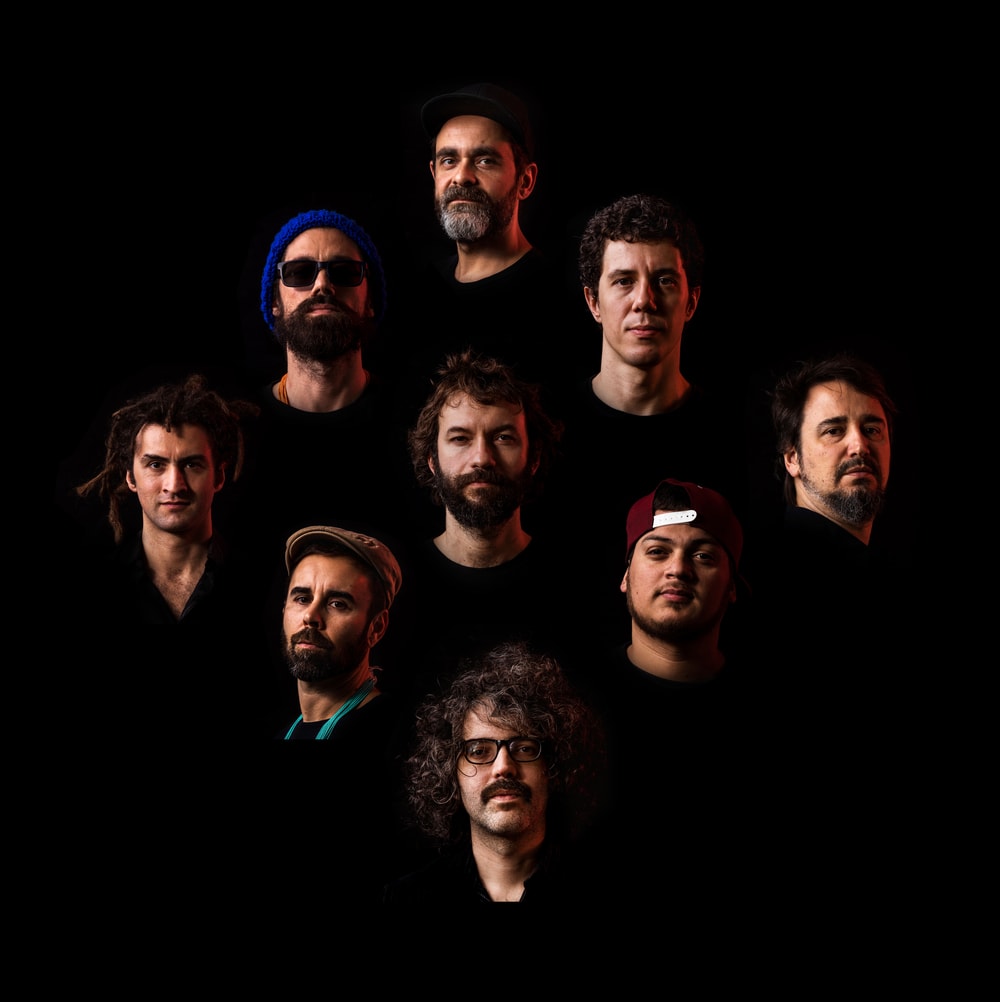
For their 4th album, Quebra Cabeça, the Brazilian afrobeat big band bring forward more complexity to their musical puzzle and also welcome the electronic vibrations of the São Paulo megalopolis to the studio.
May, 2016. Ten colorfully clothed musicians with large contagious smiles have just taken to the stage in Praça da República, one of the main squares of downtown São Paulo. By late afternoon, Thousands of people have gathered, waiting for a free concert, an opportune event that may help cure the hangover resulting from the recent impeachment of former labour-socialist president Dilma Roussef, now substituted by Michel Temer. But as everyone already knows: the latter, an old white man, is all rigor, conservatism and violence against any person that does not fall into (his) line – Blacks, trans, gays, feminists, the favelas’ poor inhabitants… By the evening, an extravagant young person shares cachaça shots and beer bottles, sold by dozens of merchants equipped with DIY trolleys – not your average food truck, but one made up of bicycle wheels, supermarket trolleys and old wooden boards found on the street, that sometimes resemble open air junkyards than clean pavements. One thing for sure is that São Paulo knows well is how to combine order and chaos, luxury and misery, privilege-based hierarchy and a DIY survival system. People make do as they can to cope with this larger-than-life confusing situation. That night, on stage, Bixiga 70’s odd afrobeat was a true release valve for deep and long-lasting social pressures.
October, 2018. Ten colorfully clothed musicians with large contagious smiles on their faces have just taken over the record shops worldwide, comfortably seated from their São Paulo studio. Their latest record is an opportunity that may help cure the heavy hangover resulting from the recent results of the Brazilian presidential elections’ first round. Jair Bolsonaro, an ex-colonel and nostalgic of a military dictatorship and promoter of a fascist and authoritarian ideology, is well in the lead with an unbelievable vote of 46%. And everyone knows: if he ever wins the second round, the severe policies initiated by his predecessor would likely increase, and the social chaos would soon turn into a civil war. The latent conflict will call for new militias of solidarity and democracy. Would music then still be brought to sooth the souls? Bixiga 70’s sound appears to meet all the requirements.
“Bixiga is the story of São Paulo in miniature form.”
This Brazilian afrobeat band is a 10-member gang that have stepped onto stages worldwide since 2010 with their first rehearsals in Bixiga, a cosmopolitan neighborhood in downtown São Paulo. Fascinated by the musical fusion of the Nigerian master Fela Kuti, the musicians paid him a tribute with the “70” that punctuates their name. But far from only imitating and appropriating the music they’ve listened to and played for years, they have patiently composed the countless sonic pieces of this “puzzle” – “quebra cabeça” deploys games that require patience, dexterity and observation – whose background ambience is of the urban sounds of the wild megalopolis they stride across everyday, and also in tune with the city’s developments in electronic music, a novelty in the big band’s sonic signature.
“What we put on top of [the African influence] is essentially the urban music of São Paulo”, they say of Quebra Cabeça. “This city is a huge influence on us. It has that sense of urgency, always running to catch up. It’s expensive, and services are awful, with so much pollution and violence. But it’s our home and it was developed through migration. Bixiga is where people come first of all. It’s always had that influx; it’s the story of São Paulo in miniature form.”
By continuously absorbing their everyday life in a cosmopolitan city, the band relays the voices of communities that advocate the great and precious variety of Brazil’s society, largely shaped by the culture of African slaves and their descendants, altered through the contact of a new territory. Their recent collaborations with Ghanean singer Pat Thomas and Nigerian saxophonist Orlando Julius illustrate this spirit.
“From the very beginning, what we have always had in common is African-Brazilian music,” explains baritone sax player and flutist Cuca Ferreira. “Some of us come from candomblé (the African-Caribbean religion), others from jazz, reggae, dub, everything. The whole idea of the band has been to take all these different elements that make us, from Africa and Brazil, and create a hybrid form from them.”
A hybrid form. Here may lay the essential piece of Bixiga 70’s “puzzle”, which might also be the essential approach for the transformation of Brazilian society into an egalitarian land, ruled by justice. For everyone. A true puzzle…
Listen to Bixiga 70’s Quebra Cabeça (Glitterbeat Records) here.
Read next: ‘Boca de Lobo’: a walk into the wolf’s den with Criolo’s last video about Brazil’s social emergency




